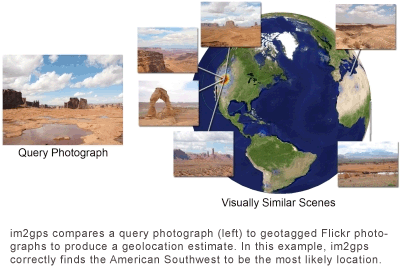Relevant Links
Press Release
Research Paper
Media Contact
Keywords
Big-Data, Internet, GPS, geolocate, image, im2gps
Buzz
COMPUTING RESEARCH HIGHLIGHT OF THE WEEK [Nov 19-26, 2008]
Algorithm Estimates Geographic Location of Photos
Researchers at Carnegie Mellon University have devised the first computerized method that can analyze a single photograph and determine where in the world the image likely was taken. It’s a feat made possible by searching through millions of GPS-tagged images in the Flickr online photo collection.
 The IM2GPS algorithm developed by computer science graduate student James Hays and Alexei A. Efros, assistant professor of computer science and robotics, doesn’t attempt to scan a photo for location clues, such as types of clothing, the language on street signs, or specific types of vegetation, as a person might do. Rather, it analyzes the composition of the photo, notes how textures and colors are distributed and records the number and orientation of lines in the photo. It then searches Flickr for photos that are similar in appearance.
The IM2GPS algorithm developed by computer science graduate student James Hays and Alexei A. Efros, assistant professor of computer science and robotics, doesn’t attempt to scan a photo for location clues, such as types of clothing, the language on street signs, or specific types of vegetation, as a person might do. Rather, it analyzes the composition of the photo, notes how textures and colors are distributed and records the number and orientation of lines in the photo. It then searches Flickr for photos that are similar in appearance.
Hays and Efros found they could accurately geolocate the images within 200 kilometers for 16 percent of images — 30 times better than chance. And even if their algorithm failed to identify the specific location, they often found that it could narrow the possibilities, such as by identifying the locale as a beach or a desert.
Identifying the locale of a photo could enhance image search techniques, making them less dependent on captions or associated text. A computer system for geolocating photos could be useful in finding photos from a specific trip and in some forensic applications. Determining the location of photos also makes it possible to combine them with geographic databases related to climate, population density, vegetation, topography and land use. Knowing the locale also can aid in such computer vision tasks as object identification, Hays said. If a computer recognizes that a photo likely was taken in Japan, for instance, the computer will have a better idea of what a taxicab should look like.
Researchers:
James Hays, Alexei A. Efros (Carnegie Mellon University)
Research support provided by:
National Science Foundation, Google
‹ Current Highlight | Past Highlights ›
Computing Research Highlight of the Week is a service of the Computing Community Consortium and the Computing Research Association designed to highlight some of the exciting and important recent research results in the computing fields. Each week a new highlight is chosen by CRA and CCC staff and volunteers from submissions from the computing community. Want your research featured? Submit it!.




